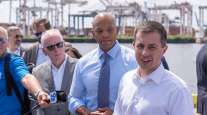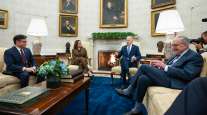Senior Reporter
Pence Tells Nation’s Mayors to Expect ‘Big’ Highway Bill

This story appears in the Jan. 23 print edition of Transport Topics.
WASHINGTON — Mike Pence, just days ahead of being sworn in as the country’s new vice president, assured hundreds gathered for the U.S. Conference of Mayors’ annual meeting that Donald Trump will follow through with an infrastructure plan.
“We’re going to do an infrastructure bill, and it’s going to be big,” Pence told the mayors Jan. 17, three days before he and Trump were sworn in to lead the country.
“It’ll have the funding to help communities and states all across America meet the needs that face too many communities and oftentimes stifle growth,” Pence added, noting mayors are the first officials to hear complaints about potholes and dilapidated structures.
Many mayors cheered after Pence announced a “big” infrastructure package would be coming from the Trump team. Earlier that day, the president and vice president, respectively, of the Conference of Mayors, Oklahoma City Mayor Mick Cornett (R) and New Orleans Mayor Mitch Landrieu (D), had called on the Trump administration to partner with Republican leaders on Capitol Hill to advance a meaningful transportation funding bill.
Specifically, Cornett and Landrieu said mayors are eagerly awaiting massive funding boosts to help cities cover the costs of big-scale infrastructure projects.
“Our nation’s highways need work,” Cornett told reporters. “America’s people deserve an investment in their infrastructure.
Cornett also expressed support for the Obama-era TIGER infrastructure grants, which the U.S. Department of Transportation has awarded annually since 2009. States and cities have sought Transportation Investment Generating Economic Recovery grants to help pay for large-scale projects.
In 2013, the American Society of Civil Engineers gave the country’s infrastructure a D-plus grade.
“We like TIGER grants,” Cornett said. “If she has another idea she’d liked to do, we’d be glad to talk to her about it,” he added, referring to Trump’s transportation designee, Elaine Chao.
Pence did not outline the “big” infrastructure measure’s specifics. Nor did the vice president-elect lay out specific funding proposals that would finance projects.
Trump promised to unveil a bill within his first 100 days in office that would aim to invest $1 trillion over 10 years by providing tax credits to investors. But Chao, who formerly led the Department of Labor, told senators earlier this month that the administration would assemble a task force to identify funding proposals aimed at the country’s transportation system.
Chao argued before a Senate panel that public-private partnerships are ideal funding vehicles for infrastructure projects.
When a Trump-led infrastructure proposal reaches the halls of Congress, Democrats in both chambers have promised to scrutinize it. House Democratic Leader Nancy Pelosi (D-Calif.) pledged Jan. 13 to support a Trump plan as long as “it’s not a tax break at the high end disguised as an infrastructure bill.” Senate Minority Leader Chuck Schumer (D-N.Y.) has said he shares Pelosi’s concern.
Sarah Kline, a fellow at the Bipartisan Policy Center think tank, said state and city leaders struggling to advance large-scale infrastructure projects should look to private capital for assistance.
“There’s a lot of money, private-sector money, that could be brought to bear to help U.S. infrastructure projects move forward faster,” Kline said at the mayors’ annual meeting Jan. 18.
“We need to be a lot more intentional in this country about how we develop, design and deliver our infrastructure,” Kline added. “Obviously, there’s a huge need right now for additional maintenance and repair, as well as expansion of all of our infrastructure networks.”
Public-private partnerships, or P3s, typically have meant erecting tolling facilities. Kline acknowledged tolls are unpopular and cited for the mayors an example of a toll-free P3 project: The new tunnel at the Port of Miami, where private-sector dollars and public agencies backed a toll-free project.
Kline outlined her proposal last year in a report titled, “Bridging the Gap Together: A New Model to Modernize U.S. Infrastructure.”
Mayors representing megaregions and rural towns have expressed concerns over how to fund infrastructure modernization projects.
Transportation Secretary Anthony Foxx on Jan. 18 outlined challenges the country’s transportation system will face in the coming years.




